#Colm Meaney
Text

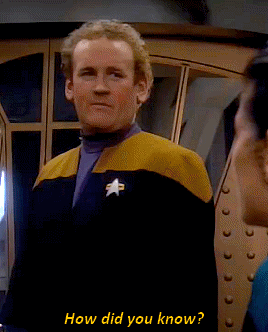
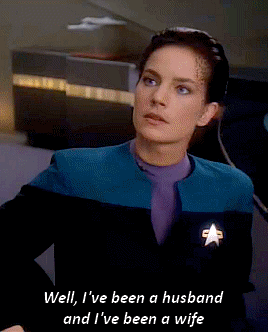
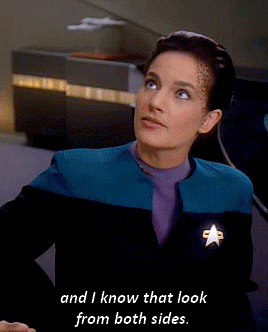
STAR TREK: DEEP SPACE NINE - S3E3 The House of Quark
#trekedit#star trek#star trek deep space nine#jadzia dax#miles o'brien#terry farrell#colm meaney#star trek*#ds9*#ds9 3x03#jadzia dax*#miles o'brien*#my gifs
4K notes
·
View notes
Text
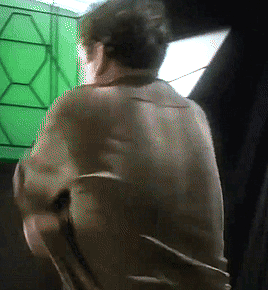
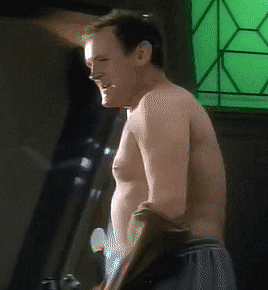
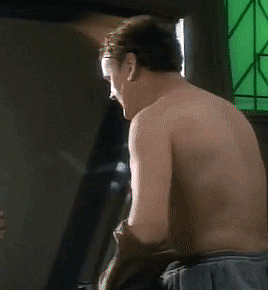
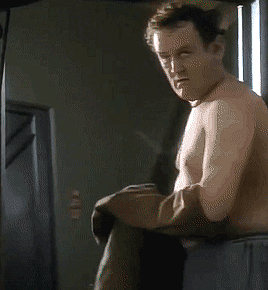
Of the decision to have O'Brien appear shirtless, director David Livingston commented, "I thought it was important. He represents the common man on the show, and common men, when they get sweaty, take off their shirts. And so what if he doesn't look like Fabio. He looks real, like a Human being. (…)"
On the prospect of being a sex symbol, Colm Meaney (Miles O'Brien) joked, "It would seem to me that there are far more likely candidates for it!" (x)
STAR TREK: DEEP SPACE NINE
season 2, episode 11
#star trek#trekedit#startrekedit#treksource#ds9edit#tvedit#trekdaily#scifiedit#tvfilmdaily#miles o'brien#colm meaney#ds9#zsófi creates#YOU ARE hot to me!!!!!!!!! YOU ARE THE HOTTEST MAN IN THE ST UNIVERSE!!!!!!!!!!!!!! TO MEEEE
1K notes
·
View notes
Text
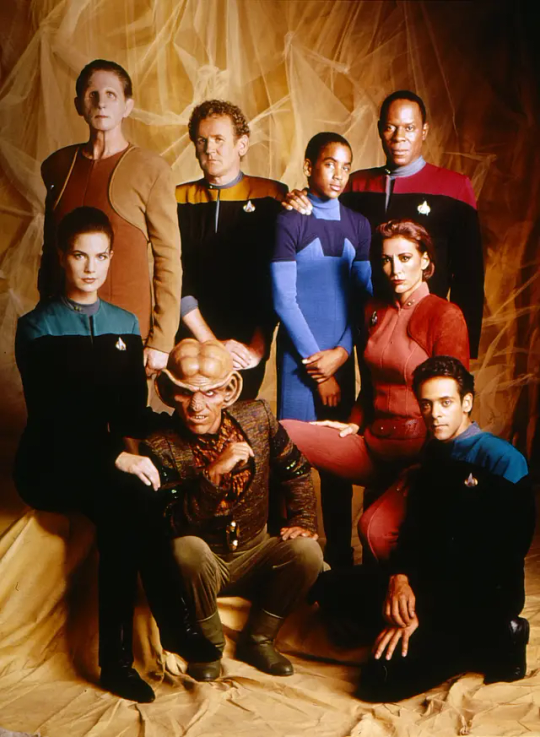
Star Trek: Deep Space Nine premiered 31 years ago today on January 3rd, 1993.
Happy Anniversary, DS9!
#star trek: deep space nine#star trek#deep space nine#ds9#avery brooks#nana visitor#rene auberjonois#terry farrell#alexander siddig#colm meaney#armin shimerman#cirroc lofton
2K notes
·
View notes
Photo
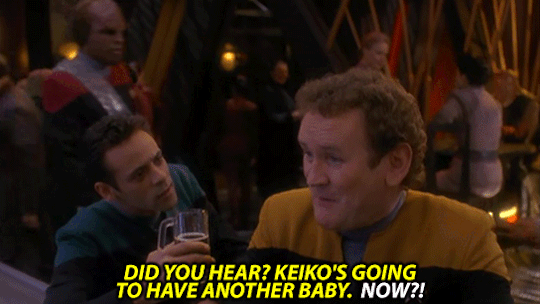
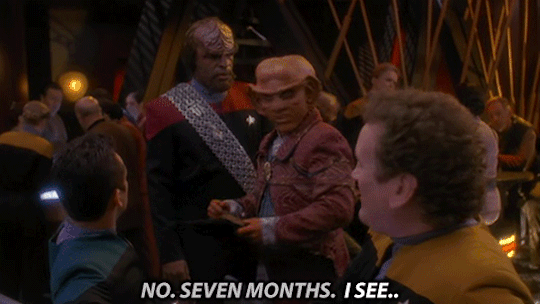
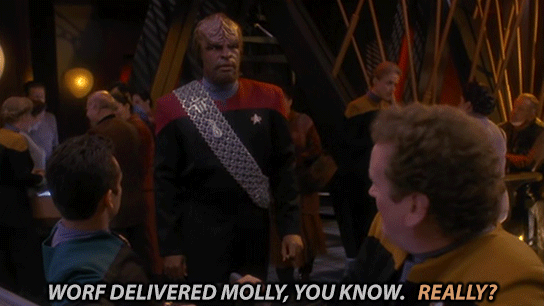
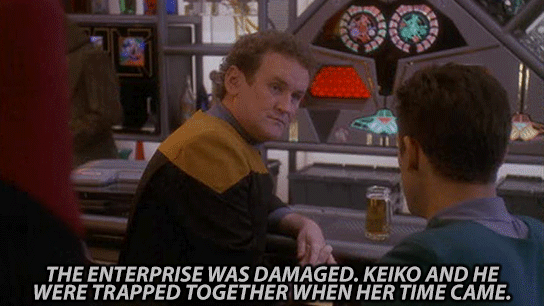
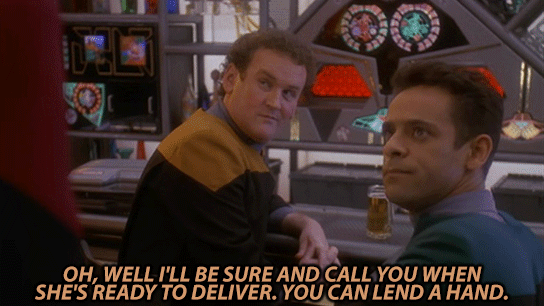
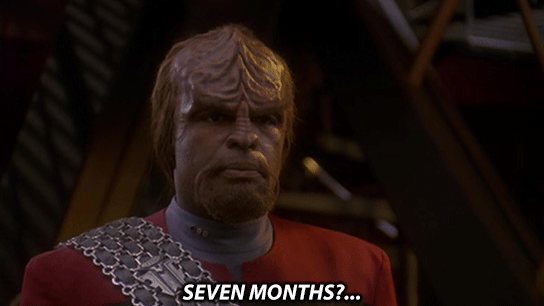
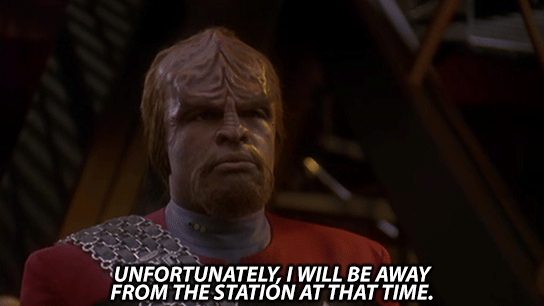
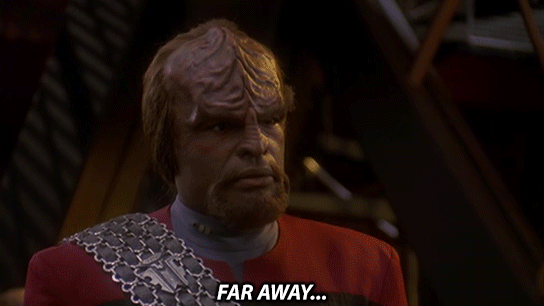

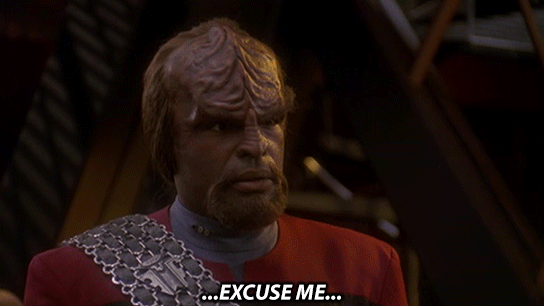
Star Trek: Deep Space Nine // S04E17: Accession
#Star Trek#Deep Space Nine#ST: DS9#ST DS9#DS9#Star Trek Deep Space Nine#Star Trek DS9#Worf#Worf Son Of Mogh#Michael Dorn#Quark#Armin Shimerman#Miles O'Brien#Colm Meaney#Julian Bashir#Alexander Siddig#Gifs#Television#Television Gifs#Star Trek Deep Space Nine Gifs#AVGifs#AVTV#AVTVGifs#AVDS9Gifs#AVStarTrekGifs
5K notes
·
View notes
Text

#this bts photo is so cute#I’m pretty sure this was during the end of the first/second episode#babies#ds9#deep space nine#colm meaney#avery brooks#benjamin sisko#miles o’brien
173 notes
·
View notes
Text

In celebration of the 30th anniversary of DS9's first episode (January 3, 1993), please enjoy my favourite representative Netflix display image of the series.
Happy 30th, DS9!
#star trek#star trek ds9#star trek deep space 9#ds9#happy 30th anniversary to ds9#miles o'brien#colm meaney#i feel old#miles o'brien's terrible horrible no-good very bad day
1K notes
·
View notes
Text



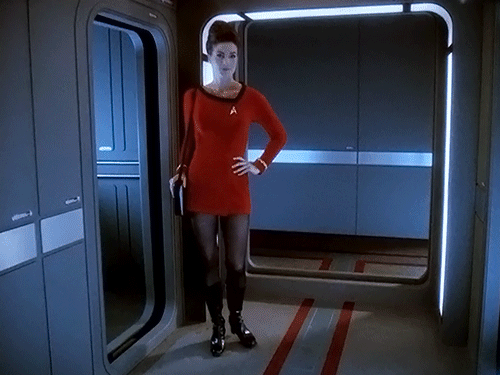

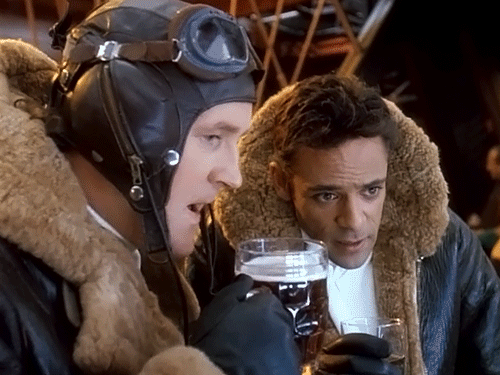

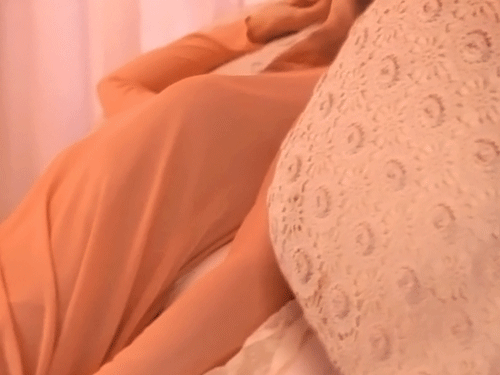
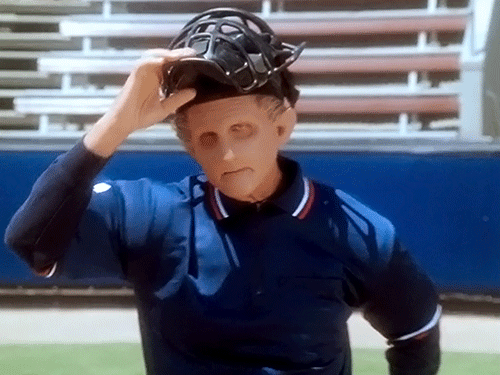
Star Trek: Deep Space Nine Costume Party!
#star trek: deep space nine#DS9#Max Grodénchik#Aron Eisenberg#nana visitor#Avery Brooks#terry farrell#Michael Dorn#Colm Meaney#Alexander Siddig#Cirroc Lofton#Armin Shimerman#Rene Auberjonois#Rom#Nog#kira nerys#benjamin sisko#jadzia dax#Worf#miles o'brien#julian bashir#jake sisko#Quark#Odo#my gifs#my edits#tv edits#tv : Star Trek#Star Trek#Star Trek Costume Party
1K notes
·
View notes
Text
as an Irish (we don’t call it “Gaelic”, ever) speaker and a Sunny fan, I thought it would be fun to do a bit of a post about the Irish-language scene in The Gang’s Still in Ireland, because it’s not a scene I see widely discussed but I adore it.
some background. I am not a native Gaeilgeoir (Irish speaker) — my first language is English — but I started learning it age five and have always had very high grades in it and a huge love for it. I was hugely excited about Charlie Kelly being able to read Irish in the previous episode, and even more so when he turned out to be able to speak it.
Colm Meaney, the actor who plays Shelley Kelly, grew up in Ireland and as such would have learned Irish throughout his time in school. (this has been required by law more or less since Irish independence, and it was already quite common before that. nowadays, you can get exemptions for things like dyslexia but otherwise you have to do it.) this is clear in his ease with the language. (I will do a post about where in Ireland Shelley lives at some point, because there aren’t many areas where Irish is the principal language, but that is for another day!) both the actor and the character have easy and good Irish.
Charlie Day, as an Italian-American, obviously does not actually speak the language and presumably learned the lines as a bunch of gibberish sounds. (nonetheless, some of his pronunciations do suggest he had the words written down non-phonetically too.) his delivery of the lines is god damn amazing. Charlie Kelly’s Irish is not remotely American-accented. if I heard someone speaking Irish like that, I’d assume they sounded Irish when speaking English. he doesn’t even sound neutral in Irish; he does actively have an accent (the word choices are more non-regional, not pointing to any of the three distinct dialects, but this makes sense as the same is true of Shelley’s Irish). his pronunciation is so on point and his accent is seriously just a delight to listen to. that’s serious effort to have been put in by an American in a show that routinely makes fun of Irish-Americans! I cannot stress enough how cool it is to see my national language like this and how good a job he does.
as a side note, Charlie Kelly finding Irish much easier to read than English makes total sense! he clearly has dyslexia, as well as intellectual disabilities and autism, so literacy being tricky is totally fair, but is probably being made worse in English by how much of a god damn ridiculous illogical irregular mess the language is. English has around two hundred irregular verbs, and that’s before we even begin to consider the irregularity of its spelling. Irish has eleven irregular verbs, multiple of which are only irregular in one tense. its spelling is entirely consistent and, once the rules are known, any word (pretty much) can be flawlessly pronounced from reading it or flawlessly spelled from hearing it. (I promise Irish names make sense. just not if you try to use English rules on them. the languages are very different!) Irish is one of the most regular languages out there.
so, I thought I’d go through the actual scene. I’m going to put each line, the direct translation, the subtitle provided, and a comment. hopefully this will be interesting to someone other than me!
·—·
“is mise do pheannchara, a Charlie.” (Shelley)
direct translation: “I’m your pen pal, Charlie.”
subtitle provided: “I’m your pen pal, Charlie.”
okay, so they translate “pen pal” two different ways in this scene. the first, used here, is “peannchara”. this is a compound word, much like all those long words you get in German. it’s a perfectly good choice given there is no one standard choice for translating that concept.
“tá brón orm, ach ní thuigim cad atá ráite agat. is féidir liom gibberish a léamh, ach ní féidir liom í a labhairt.” (Charlie)
direct translation: “I’m sorry, but I don’t understand what you’ve said. I’m able to read gibberish, but I’m not able to speak it.”
subtitle provided: “I’m sorry. I don’t understand what you just said. I read gibberish, but I don’t speak it.”
I would slightly disagree with the subtitles here. the “just” bit isn’t expressed at all. in fact, there is no Irish equivalent to that word, and we often just use the English one in the middle of an Irish sentence because of this. however, I expect that RCG (Rob McElhenney, Charlie Day, Glenn Howerton) wrote the subtitles and then handed them to an Irish translator, in which case the translator did a perfectly good job. a couple of notes about the use of “gibberish” here. I love it. firstly, we totally do drop English words into sentences like that. secondly, I really like the choice to use the feminine form of “it” here (that is, to make “gibberish” a feminine noun). all languages except English are feminine nouns in Irish as a rule, so it’s just a lovely detail calling back to the fact that Charlie thinks of it as the gibberish language. also, Charlie Day really does absolutely nail that voiceless velar fricative (the consonant sound in “ach”, as in Scottish “loch” or any number of German words), a sound even many natively English-speaking Irish people are lazy about. good on him.
“níl aon ciall le sin. sé á labhairt anois!” (Shelley)
direct translation: “there’s no sense to that. it’s being spoken now!”
subtitle provided: “that doesn’t make any sense. you’re speaking it now!”
I adore the phrasing of the first sentence here. thoroughly authentic. there are much more obvious ways to phrase it, but this is absolutely what a native speaker might go with. same goes for the second, actually. Colm Meaney says the second line in a sort of shortened way (same idea as how we might turn “do not” into “don’t”) so I’ve struggled slightly with how to directly translate it. interestingly, Shelley categorises “gibberish” as a masculine noun here, but this isn’t really wrong since it doesn’t have an official grammatical gender due to not being an actual Irish word. just a little odd. also, to fit better to the subtitle of the second sentence, I personally would’ve gone with “tá sé á labhairt agat anois” rather than “tá sé á labhairt anois” (the full version of what Shelley says), as this includes the information of by whom it is being spoken.
“’s é mo dheartháir mo chara pinn.” (Charlie)
direct translation: “it’s my brother that’s my pen pal.”
subtitle provided: “but my pen pal is my brother.”
firstly, to be clear, the nuance of the sentence structure here is not captured in either of the above translations because there simply is not an English equivalent to it. secondly, Charlie uses a contraction here by shortening “is é mo dheartháir mo chara pinn”. super cool. also, there’s that other translation of “pen pal”! this one is “cara pinn”, which uses the Irish genitive case (the word mutates instead of using an equivalent of the English word “of”; this case also exists in other languages including Swedish, German, Latin, and Greek). I like this translation very much too. both work! Charlie Day again delivers this line really nicely, even stressing the word for “brother” (and pronouncing its initial consonant mutation absolutely gorgeously)! I am truly very impressed.
“níl aon fhírinne le sin, a mhic. ’s é do chara pinn… d’athair.” (Shelley)
direct translation: “there’s no truth to that, son. it’s your pen pal who is… your father.”
subtitle given: “no son. your pen pal is your… father.”
so, I really disagree with the first sentence of the subtitles here. it works, but also misses a lot of the beautiful nuance that could have been got. I would have gone with “that’s not true, son” or, more likely, “that’s not right, son”. I also disagree with the placement of the ellipsis in the second sentence, as you see (and my frustrations in translating this sentence structure to English continue, as well). however I like the use of “a mhic” (“son”) here, very much. this is a mutated form of “mac”, meaning “son” (yes, as in all of those Irish surnames; they all just basically say who the person is the son of). it carries both meanings that exist in English: an actual son, but also the use of the word as an affectionate way to refer to any man younger than the (usually male) speaker. this is a really nice choice.
·—·
so, yeah! those are my thoughts. feel free to ask any questions you like. I love this scene so much. as well as the reasons above about how good the translation and delivery is, I also love two other main things about this.
firstly, the level of dignity given to the language. Sunny makes fun of Irish-Americans all the time, but doesn’t really do the same to Irish people from Ireland, which I like (I do also wanna talk about Mac and Charlie as members of the Irish diaspora because it is so so interesting, but that is for another day). Irish as a language is not often given dignity, especially in American or English media, so I really love that it isn’t the butt of the joke here.
secondly, that such a significant scene is delivered through this language. just wonderful. after fourteen and a half series, we finally discover the biological father, and the scene cannot be separated from this beautiful language. it just is so perfect.
RCG, and of course Charlie Day in particular, we Gaeilgeoirí (Irish speakers) thank you! our little language made it to the screens of so many people around the world.
I hope this was interesting haha.
·—·
edits: fixed some things I mistyped.
#always sunny#iasip#sunny#it’s always sunny in philadelphia#irish#gaeilge#irish language#charlie kelly#charlie day#colm meaney#rob mcelhenney#glenn howerton#megan ganz#rcg#ireland#irish diaspora
450 notes
·
View notes
Text
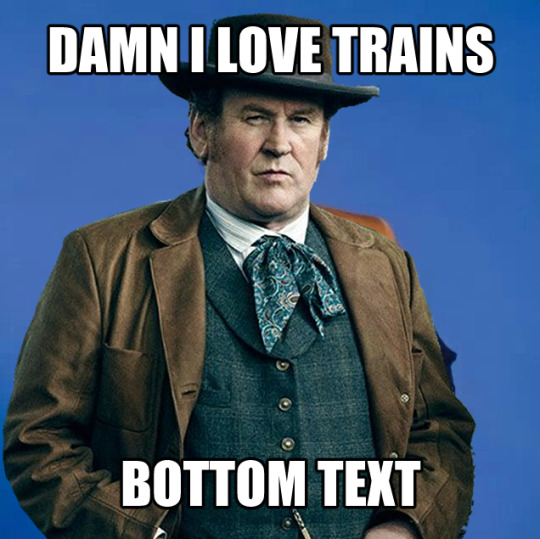
77 notes
·
View notes
Text
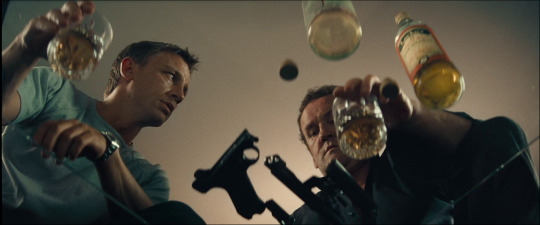


64 notes
·
View notes
Text
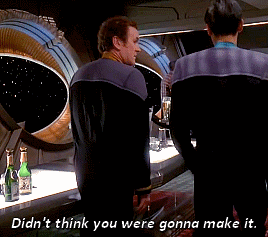
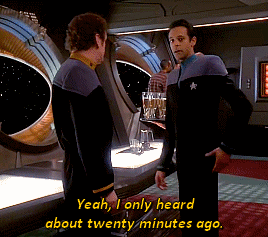


STAR TREK: DEEP SPACE NINE - S7E18 'Til Death Do Us Part
#trekedit#star trek#star trek deep space nine#julian bashir#quark#miles o'brien#siddig el fadil#alexander siddig#armin shimerman#colm meaney#star trek*#ds9*#bashir*#quark*#miles o'brien*#my gifs
1K notes
·
View notes
Text


literally shaking and crying and falling to my knees and begging so so so much
#i am in fact not normal about him#miles o'brien#star trek#deep space nine#ds9#colm meaney#zsófi rambles
57 notes
·
View notes
Text


DS9 crew wearing TOS uniforms.
#Star Trek#Star Trek: Deep Space Nine#Trials and Tribble-ations#Avery Brooks#terry farrell#alexander siddig#colm meaney#benjamin sisko#jadzia dax#julian bashir#miles o'brien
497 notes
·
View notes
Photo
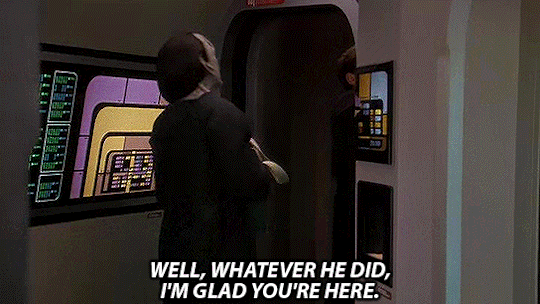
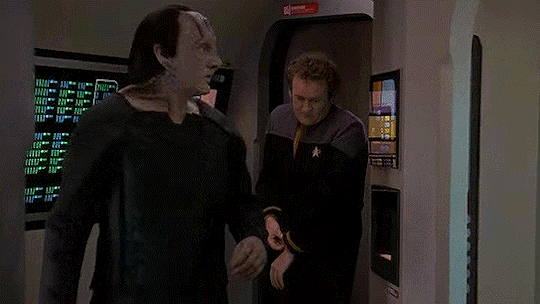
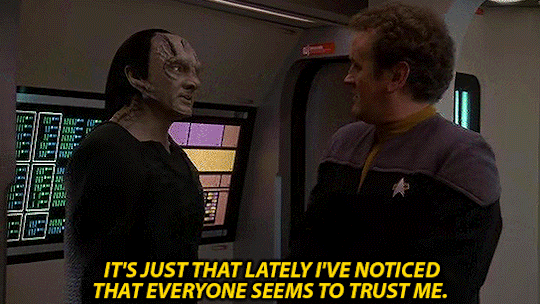


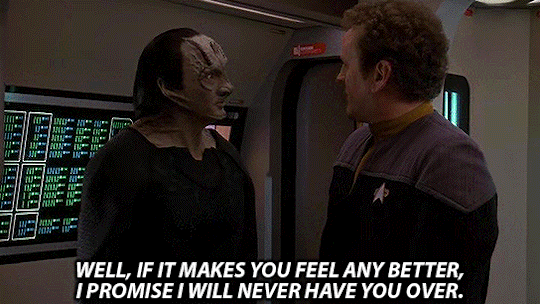
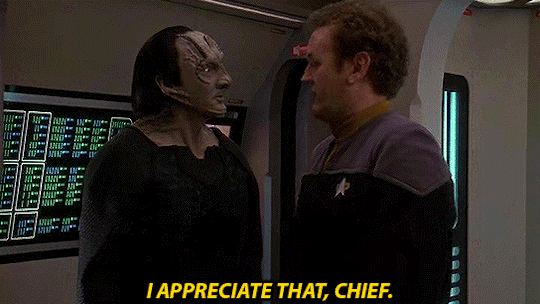
Star Trek: Deep Space Nine // S05E24: Empok Nor
#Star Trek#Deep Space Nine#ST: DS9#ST:DS9#DS9#Elim Garak#Andrew Robinson#Garak#Colm Meaney#Miles O'Brien#Chief O'Brien#Chief Miles O'Brien#ST DS9#STDS9#Star Trek Deep Space Nine#Star Trek DS9#Star Trek Deep Space Nine Gifs#Gifs#Television#Television Gifs#AVTV#AVTVGifs#AVGifs#AVDS9#AVDS9Gifs
3K notes
·
View notes
Text
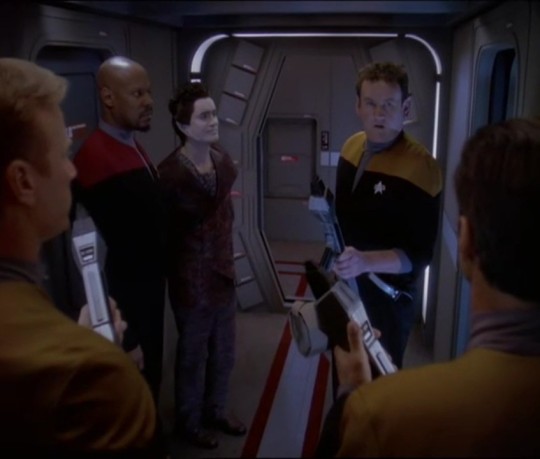
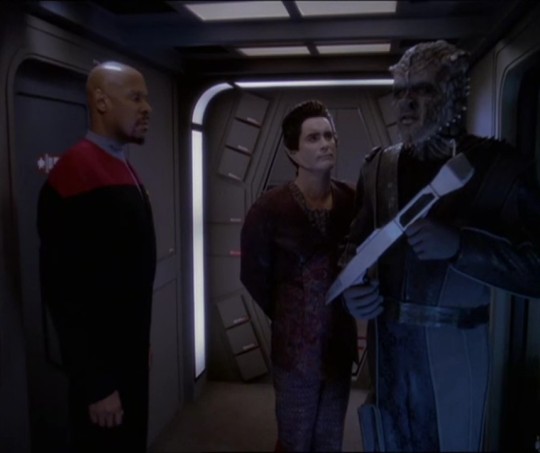


Star Trek: Deep Space Nine
S04E22 To the Death (1996)
Weyoun
#jeffrey combs#weyoun#vorta#star trek#ds9#star trek deep space nine#deep space nine#star trek ds9#miles o’brien#sisko#benjamin sisko#colm meaney#avery brooks
28 notes
·
View notes
Text
'Irish actors claim they have been treated like the poor relations in the film industry for decades despite big government tax breaks for major studios.
LA-based actor Alan Smyth revealed that Colin Farrell, Ruth Negga and Cillian Murphy have signed a petition for fair and equal pay for native performers and crew.
Over 2,500 people have added their signatures online.
It says the Irish diaspora in the US and worldwide strongly support the efforts of Irish Actors Equity, which is in talks with several government ministers to secure a guarantee “that Irish performers will not be subject to lesser terms and conditions regarding their intellectual property rights than international performers in similar roles”.
“This, unfortunately, has been the case for many years,” it states.
The petition is still open as Irish Equity plans to hold a solidarity rally with the striking SAG-AFTRA union and the Writers Guild of America today.
Smyth, who is from Dundalk, has first-hand experience of the set-up on both sides of the Atlantic. He has reaped the benefits of the American system where actors traditionally got residual cheques whenever their performances are aired.
The threat now, he says, is that the so-called “streamer” networks are imposing drastic cuts to the value of the residuals.
Hence, the strikes.
“It’s a lot worse in Ireland,” said the actor, who has starred in a number of big TV dramas, including CSI: NY and Criminal Minds.
“The system in Ireland is that the Irish cast and crew for the most part, unless it’s Colin or Cillian, are put on buyout contracts so don’t get residual payments.
“The awful thing about it is the Irish Government gives tax breaks to film and TV productions. Within the productions, the Irish cast and crew are paid far less than anyone brought over from England or the US. It’s 100pc discriminatory.
“Colin, Cillian and Ruth Negga have got behind the petition. They know how hard it is until you get to a point where you’re doing really, really well. I can really see how hurtful it is in Ireland.”
Actor Gerry O’Brien lodged a cheque for $800 (€735) yesterday for his role as an Irish man in Pirates of the Caribbean years ago. The payment covers just a quarter of the year.
He got a US contract for the job, rather than the typical Irish buyout one.
In contrast, he has earned just €54 in residuals in the last 20 years here. That was for an RTÉ TV series.
O’Brien said Equity wants a contract for Irish actors like that on offer to their British counterparts. The coveted UK contract sets out minimum pay rates, residual arrangements and other terms and conditions.
Irish production companies offer the buyout contracts on behalf of the major international studios when they are in town, he says.
A Dublin-based actor (27) did not want to be named for fear he would be “blacklisted” when going for jobs.
He has been following the Hollywood strike very closely.
“It shines a light on just how unfair the industry is,” he said.
“Those at the top are earning incredible amounts of money and profit. In a large part, it is due to those at the bottom scraping a living.
“I graduated from drama school in 2017. Last year, I made the most money I ever made working as an actor and that was €14,000. Obviously that is not sustainable.
“If you work on an Irish film, you get paid for the day of work and never see another penny. I routinely sign off my rights for €600 or €700 a day.
“I’m delighted that Cillian Murphy and Colm Meaney are coming out in support of small fry actors like myself.”
Actor Owen Roe has won many theatre awards during his career and his film appearances including Breakfast on Pluto, Intermission, Wide Open Spaces and Michael Collins.
He said actors here are “not prepared to go on strike” but it is an opportunity to inform younger ones of their rights.
“It’s far more competitive as well . There is AI and all those things. The whole buyout situation is not good for us.”
He was glad to see Cillian Murphy and other stars walk out of the Oppenheimer premiere in support of their US union.
“They don’t have to financially, I’d imagine,” he said. “It gives confidence to people who feel they are being exploited.
“I think it will be interesting to see what happens in America. If the whole thing of buyouts and residuals gets sorted. The attitude that we’re cheaper is offensive,” he said.'
#Cillian Murphy#Oppenheimer#Alan Smyth#Colin Farrell#Irish Equity#SAG-AFTRA#Ruth Negga#Owen Roe#Breakfast on Pluto#CSI: NY#Criminal Minds#Gerry O Brien#Pirates of the Caribbean#Colm Meaney#Intermission#Wide Open Spaces
88 notes
·
View notes